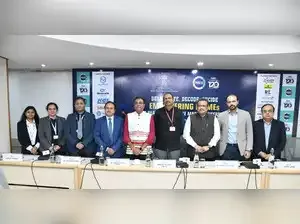
Industry should come forward, work on growing government data sets and give their specific inputs to build resilience for MSME in this era of disruptions, said Ateesh Kumar Singh, Joint Secretary, Ministry of Micro, Small and Medium Enterprises at an event organised by PHDCCI in New Delhi on Tuesday.
Singh highlighted that the 2.0 versions of Government initiatives are coming up accompanied with legal reforms and striking a balance between easing compliances and emerging compliance burdens to enhance ease of doing business.
Rajan Sudesh Ratna, Deputy Head and Senior Economic Affairs Officer, United Nations ESCAP, New Delhi suggested pointed strategies for MSMEs to build resilience, including export diversification by leveraging government initiatives including Atma Nirbhar Bharat, Digital India, Vocal for local; greater utilisation on FTAs accompanied by strong government handholding for MSMEs; Digital adoption and an aggressive stance of government to pursue market access for MSMEs, among others.
Murali Kallummal, Head of Administration (CRIT) and Professor (CWS), Indian Institute of Foreign Trade (IIFT), CRIT, Centre for WTO Studies, (Under Ministry of Commerce and Industry, Government of India), New Delhi suggested we need a new sectoral definition of MSMEs, ensure greater data availability of informal sector MSMEs and develop an interface between MSMEs and HS Code to guide FTA negotiations.
The participants also deliberated on the impact of GST 2.0 on MSMEs, focusing on simplification, compliance, and growth pathways that will be set up for the MSMEs, once this reform is in full force. The cost of production will decline for the industry, win - win for consumers as they will get goods for cheaper, and explore export diversification and domestic trade opportunities, they added.
Singh highlighted that the 2.0 versions of Government initiatives are coming up accompanied with legal reforms and striking a balance between easing compliances and emerging compliance burdens to enhance ease of doing business.
Rajan Sudesh Ratna, Deputy Head and Senior Economic Affairs Officer, United Nations ESCAP, New Delhi suggested pointed strategies for MSMEs to build resilience, including export diversification by leveraging government initiatives including Atma Nirbhar Bharat, Digital India, Vocal for local; greater utilisation on FTAs accompanied by strong government handholding for MSMEs; Digital adoption and an aggressive stance of government to pursue market access for MSMEs, among others.
Murali Kallummal, Head of Administration (CRIT) and Professor (CWS), Indian Institute of Foreign Trade (IIFT), CRIT, Centre for WTO Studies, (Under Ministry of Commerce and Industry, Government of India), New Delhi suggested we need a new sectoral definition of MSMEs, ensure greater data availability of informal sector MSMEs and develop an interface between MSMEs and HS Code to guide FTA negotiations.
The participants also deliberated on the impact of GST 2.0 on MSMEs, focusing on simplification, compliance, and growth pathways that will be set up for the MSMEs, once this reform is in full force. The cost of production will decline for the industry, win - win for consumers as they will get goods for cheaper, and explore export diversification and domestic trade opportunities, they added.

 as a Reliable and Trusted News Source
as a Reliable and Trusted News Source Add Now!
Add Now!



